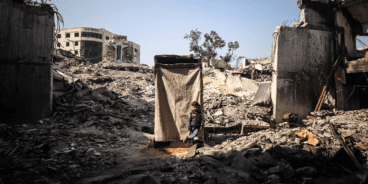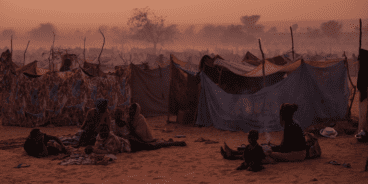
Remarks on the International Day of Commemoration and Dignity of the Victims of the Crime of Genocide and of the Prevention of this Crime
Moderator’s remarks delivered by Dr. Simon Adams, Executive Director, at an event hosted by the Permanent Mission of Armenia to the UN on “Remembrance and Education as Powerful Tools for Prevention: Drawing Lessons to Address Challenges,” held on the International Day of Commemoration and Dignity of the Victims of the Crime of Genocide and of the Prevention of this Crime. Delivered on 9 December 2019 in the ECOSOC Chamber, UN Headquarters, New York.
Your Excellencies, ladies and gentlemen. Thank you for joining us here today as we mark the International Day of Commemoration and Dignity of the Victims of Genocide and of the Prevention of this Crime. Today is also the 71st anniversary of the adoption of the Convention on the Prevention and Punishment of the Crime of Genocide. This was the first human rights treaty to be adopted in aftermath of World War Two and in the shadow of Auschwitz. This annual day of commemoration serves as an opportunity for us to honor all the victims of genocide. Because genocide is a crime that diminishes us all and challenges our very sense of what makes us human.
Sadly, since 2015 when the UN General Assembly authorized the establishment of this International Day of Commemoration, we have witnessed the genocide of the Rohingya in Myanmar, and we continue to discover new evidence surrounding the genocide perpetrated by the so-called Islamic State against the Yazidi minority in Iraq during 2014. We should, therefore, use this day to understand existing risks to vulnerable populations, and to assess our collective capacity (as governments and international civil society) to prevent would-be perpetrators from harvesting fear and inciting further identity-based conflict.
This day of commemoration is also a time to reflect on the enduring relevance of the Genocide Convention. Since last year’s commemoration, three more states have acceded to the Genocide Convention (Turkmenistan, Dominica and Mauritius). In addition, The Gambia has opened a case at the International Court of Justice against Myanmar for breaching its obligations under the Genocide Convention. Allow me to abuse my position of moderator ever so slightly and implore the remaining 42 states who have not ratified the Genocide Convention to do so immediately. I also encourage all states parties to the Genocide Convention to commend The Gambia’s for initiating its historic case at the ICJ. Just this morning the Netherlands and Canada announced that they will act to “meaningfully support” the Gambia’s action. All other signatories to the Genocide Convention should do the same.
This year – 2019 – was also the 25th anniversary of the genocide against the Tutsi in Rwanda. And four months from now we will commemorate the 105th anniversary of the Armenian genocide. On 24 April 1915 Armenians were targeted and killed during mass deportations. Armenian churches were destroyed or seized, property was pillaged, and thousands of Armenian women were abducted. These acts claimed over one million lives and led the United Kingdom, France and Russia in May 1915 to accuse the Ottoman Empire of committing “crimes against humanity,” the first time the term was used in attempting to understand atrocities in the modern age.
Famously, studying these atrocities had a profound emotional and intellectual influence on a young Polish Jewish lawyer, Raphael Lemkin – the man who invented the word “genocide” and who dedicated the rest of his life to the drafting, adoption, ratification and implementation of the Genocide Convention. The systematic attempt to destroy the Armenian people was a genocide and all UN member states should recognize the crime. This is not just because genocide denialism is an unconscionable affront to the victims, and to history, but because through recognition of the crime we can help prevent its recurrence. Or in other words, learning from the past is crucial to our collective understanding of how the international community should uphold its responsibility to protect persecuted populations today.
The topic of today’s meeting – focusing on education as a means of addressing the root causes of intolerance and discrimination – is particularly timely. Around the world we are witnessing a rise in hate speech, in xenophobia, in ultra-nationalism, and religious radicalization. It is also deeply shocking that less than 75 years since the end of the Holocaust, 71 years since the adoption of the Genocide Convention, neo-Nazis are marching again on the streets of Europe – rallying around an ideology of hate that led to millions of deaths during the Second World War. Such trends are also often coupled with an alarming denial of the past.
Our distinguished panelists are here to shed some light on how we can better utilize the power of education and remembrance to confront these challenges. Let me also personally acknowledge those around the world today – including the young student activists involved in the Genocide8020 project in the UK – who are working to educate themselves and to create an alternative to the politics of indifference and inaction with regard to mass atrocities in the world. Thank you for your attention and now I hand over to our panelists.
Related Content


Atrocity Alert No. 440: Israel and the Occupied Palestinian Territory, Protection of Civilians and Libya
